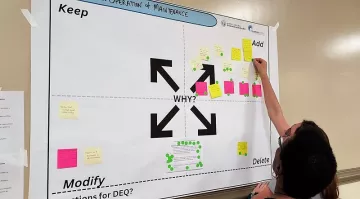By Margaret Lillard
NC Sierra Club Communications Manager
No matter where you live, you know that a good neighbor is a great blessing. When we respect each other's right to live safely and peacefully, it benefits us all.
For decades, some residents of eastern North Carolina have been struggling with neighbors who threaten their homes and their health. Factory hog farms - known as concentrated animal feeding operations, or CAFOS - have long posed problems due to the antiquated system by which they manage the waste from all those pigs.

The lagoon-and-sprayfield system calls for collecting hog feces and urine in large pits, then spraying the untreated liquid into the air and onto nearby fields. These fields are often located near homes, making the hog waste problem very much the neighbors' problem as well. The results are exactly what you might expect: Horrible odors, clouds of flies, and actual droplets of waste that blow onto property and people, making outdoor living impossible and threatening the health of the air, water and people nearby.
More than 20 years ago, North Carolina's hog farm industry was legally mandated to begin replacing the antiquated lagoon-and-sprayfield system with "environmentally superior technology." Instead, aided by our state legislature, these systems have stayed in place, even as some neighbors have won court battles over the environmental and human damage they cause.
And now the legislature has further entrenched this system by allowing the pork industry to monetize it. Lawmakers have moved to allow farm operators to capture methane emitted from the open cesspools and sell it off as as biogas, which has its own set of threats. Aside from entrenching a primative waste system that hurts people and the environment, the process creates higher concentrations of nutrient waste for the sprayfields that can’t adequately hold it, and the digesters required to create the gas are notoriously underregulated and prone to spills.
Rather than issue permits individually for each facility, taking into account its unique environment and community, DEQ issues "general permits," a set of umbrella regulations for all facilities that are opaque and inadequate at best, and disastrous at worst.
North Carolina's digester general permits are up for revision this year. DEQ is taking comment now on the permits that will be in effect from 2024 through 2029.
In early May, on behalf of the N.C. Sierra Club, I joined allies including the N.C. Conservation Network, Toxic Free NC and the Waterkeeper Alliance at a public meeting in Sampson County where DEQ officials took feedback on the permit.
The new permits haven't been drafted yet, so we were obliged to discuss our concerns based on the current permits and what we hope to see going forward.
Rather than standing to present remarks one-by-one, participants moved between several tables representing different sections of the existing permit. DEQ staff set up posters with some comments about the permit taken at stakeholder meetings, and we were able to add sticky dots next to comments we supported, plus add our own comments via sticky notes. Staff pledged to review and consider these comments as they come up with the new draft permit (scroll down for the permit drafting and comment calendar).
Highlights of our comments:
At the event, we emphasized the importance of protecting communities near CAFOS, especially as these people have for decades been burdened with the cumulative impact of waste particulate in their air, and lagoon breaches and seepage that threatens their drinking water.
Most of these neighbors are Black, Latino and indigenous people, as well as lower-income rural residents. Many don't have the means to move away, or the desire to leave homes they occupied long before factory-scale farms moved in - for generations, in some cases.
We also urged DEQ to require better reporting about the use of the waste and incidences of water contamination from spills and breaches. We asked for stricter monitoring requirements for hog waste impacts. And, as ever, we emphasized the need to adopt better, safer ways to treat and dispose of this waste, ending the lagoon-and-sprayfield nightmare.
HOW YOU CAN HELP: DEQ's current public comment period runs through June 5. Speak up!
- Call DEQ directly at (919) 707-9129
- Submit comments by email to publiccommentsDWR@ncdenr.gov
- Mail your comments to:
Animal Feeding Operations
NC Division of Water Resources
1636 Mail Service Center
Raleigh, NC 27699-1636
DEQ plans to release the draft permits in August, then schedule four public meetings (one of which will be online) and take more comments, with final permits due in January. We'll keep you posted on when the drafts are ready to review, with tips on how you can help protect the environment and the people of eastern North Carolina.